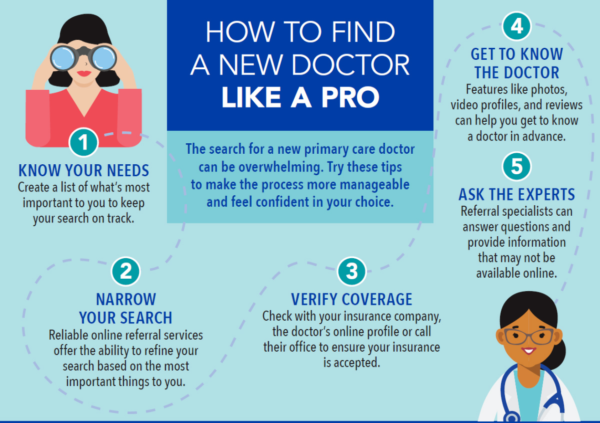

In the last year, 92.8 percent of children in the United States had contact with a health care provider, according to the Centers for Disease Control and Prevention(CDC).
That percentage drops to 82.1 percent of adults in the United States who had contact with a health care provider in the last year.
Why do fewer adults visit their doctors, and why are these annual visits so necessary?
The following 10 reasons outline the importance of having a primary care doctor.

1. Holistic Health Care
Where should you go if you develop a cough, if you’re feeling anxious and depressed, or if you are curious about a certain vaccine?
The answer: your primary care doctor! Your primary care doctor focuses on holistic health care, meaning he or she is trained in treating a little bit of everything and coordinates patient health care in one central location.
With a primary care doctor, you only need to make one appointment to discuss a variety of health issues you might be experiencing, whether they are physical, emotional, or mental.
2. Better Manage Chronic Diseases
Chronic health conditions like diabetes, arthritis and lupus are often difficult to monitor by yourself.
A primary care doctor can help you stay organized and aware of how your chronic disease is affecting your body.
Scheduling regular visits and performing routine tests are two ways your doctor can help you better maintain your chronic disease.
3. Higher Level of Comfort
Most people don’t love talking to strangers, especially about their health care needs and concerns.
Choosing a primary care doctor you trust is the first step.
The next step is scheduling regular appointments with your doctor so that you can discuss your concerns and overall health.
In addition, researchers at the Journal of Health Affairs found that patients with primary care doctors reported higher levels of satisfaction than patients without primary care doctors.
The more you visit a doctor you trust, the better your relationship with him or her and the better your care.
4. Transparency of Entire Health History
Routine visits with your primary care provider not only help with your comfort level, but they also build on your health history.
Knowledge of your health history, as well as your family health history, is imperative for the prevention of diseases and also helps your doctor catch early symptoms of serious conditions.
5. Lower Overall Health Costs
Attending regular appointments with your primary doctor might seem tedious and like a waste of money at times, but research from the Journal of Health Affairs suggests that routine appointments with a primary care doctor cut overall health costs for patients.
Regular screenings, open communication between you and your doctor, and a record of your health history all contribute to an overall lower cost of health care.
6. Routine Screenings
Taking your blood pressure at every appointment might seem like a task, but screenings like these hold great importance when it comes to your health.
Undergoing testing on a regular basis helps catch symptoms before they get worse or lead to debilitating health issues.
7. Catch Health Issues Early
While routine screenings may find certain symptoms of health issues before they become larger problems, your primary care doctor also knows you well enough to ask the right questions and detect other health issues in their early stages.
8. Referrals to Other Medical Specialists
Do you need a referral to see an ENT or a cardiologist?
Start with an appointment with your primary care doctor.
Chances are your doctor has helpful recommendations for specialists since he or she is familiar with how you prefer to participate in your health care.
9. Decrease in Hospital and ER Visits
Research shows that patients who regularly visit their primary care physicians have fewer hospitalizations and emergency visits than those who do not utilize primary care doctors.
Waiting too long to see a doctor or ignoring symptoms can lead to hospitalization or an ER visit, two of the most expensive and overwhelming outcomes for patients.
10. Better Patient-provider Communication
Communication is a two-way street, especially when it comes to your health.
Communicating your health wants, needs and concerns is crucial for your doctor to address your health appropriately.
Likewise, your primary care doctor should also feel comfortable holding honest conversations with you regarding their concerns and thoughts regarding your health.
Source: UnityPoint Clinic
Are you or a loved one looking for a primary care doctor in Illinois?
Look no further than their find a doctor tool.
Search by a doctor’s name or a clinic’s name to find the best fit for you!
more recommended stories
 Fentanyl Seizures at Border Continue to Spike, Making San Diego a National Epicenter for Fentanyl Trafficking
Fentanyl Seizures at Border Continue to Spike, Making San Diego a National Epicenter for Fentanyl TraffickingFentanyl Seizures at Border Continue to.
 Utah Man Sentenced for Hate Crime Attack of Three Men
Utah Man Sentenced for Hate Crime Attack of Three MenTuesday, August 8, 2023 A.
 Green Energy Company Biden Hosted At White House Files For Bankruptcy
Green Energy Company Biden Hosted At White House Files For BankruptcyAug 7 (Reuters) – Electric-vehicle parts.
 Former ABC News Reporter Who “Debunked” Pizzagate Pleads Guilty of Possessing Child pδrn
Former ABC News Reporter Who “Debunked” Pizzagate Pleads Guilty of Possessing Child pδrnFriday, July 21, 2023 A former.
 Six Harvard Medical School and an Arkansas mortuary Charged With Trafficking In Stolen Human Remains
Six Harvard Medical School and an Arkansas mortuary Charged With Trafficking In Stolen Human RemainsSCRANTON – The United States.
 Over 300 People Facing Federal Charges For Crimes Committed During Nationwide Demonstrations
Over 300 People Facing Federal Charges For Crimes Committed During Nationwide DemonstrationsThe Department of Justice announced that.
